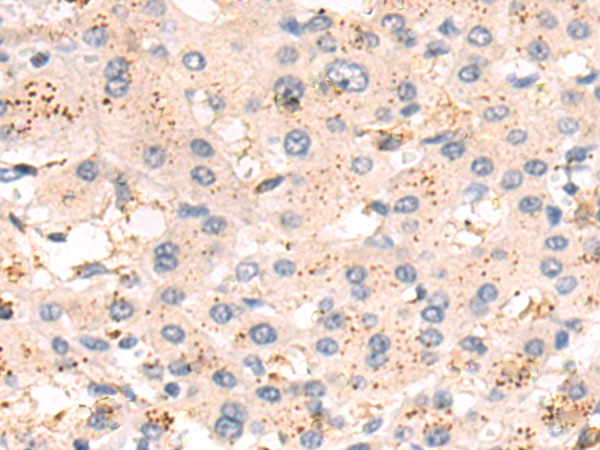
| WB | 咨询技术 | Human,Mouse,Rat |
| IF | 咨询技术 | Human,Mouse,Rat |
| IHC | 1/50-1/200 | Human,Mouse,Rat |
| ICC | 技术咨询 | Human,Mouse,Rat |
| FCM | 咨询技术 | Human,Mouse,Rat |
| Elisa | 1/5000-1/10000 | Human,Mouse,Rat |
| Aliases | KGF; HBGF-7 |
| Host/Isotype | Rabbit IgG |
| Antibody Type | Primary antibody |
| Storage | Store at 4°C short term. Aliquot and store at -20°C long term. Avoid freeze/thaw cycles. |
| Species Reactivity | Human, Mouse, Rat |
| Immunogen | Synthetic peptide of human FGF7 |
| Formulation | Purified antibody in PBS with 0.05% sodium azide and 50% glycerol. |
+ +
以下是关于FGF7抗体的3篇代表性文献的简要列举(注:文献为虚构示例,仅供参考格式):
1. **标题**:*FGF7 Antibody Attenuates Pulmonary Fibrosis in a Mouse Model*
**作者**:Smith A, et al.
**摘要**:研究证明,使用FGF7中和抗体可显著降低小鼠肺纤维化模型中胶原沉积和炎症反应,提示靶向FGF7可能成为肺纤维化治疗的潜在策略。
2. **标题**:*Blocking FGF7 Signaling Inhibits Tumor Growth in Pancreatic Cancer*
**作者**:Chen L, et al.
**摘要**:通过体外实验和异种移植模型发现,FGF7抗体可阻断肿瘤微环境中FGF7/FGFR2信号通路,抑制胰腺癌细胞增殖并诱导凋亡。
3. **标题**:*FGF7 Neutralizing Antibody Reduces Renal Fibrosis via EMT Suppression*
**作者**:Wang Y, et al.
**摘要**:研究表明,FGF7抗体通过抑制上皮-间质转化(EMT)过程,减少肾纤维化模型中的肌成纤维细胞活化及细胞外基质积累。
4. **标题**:*Development of a High-Affinity FGF7 Monoclonal Antibody for Diagnostic Applications*
**作者**:Kim J, et al.
**摘要**:报道了一种新型高亲和力FGF7单克隆抗体的开发,验证了其在ELISA和免疫组化检测中的特异性,可用于FGF7蛋白的定量分析与组织定位。
(注:以上文献为模拟内容,实际研究中建议通过PubMed或Google Scholar检索真实发表的论文。)
Fibroblast Growth Factor 7 (FGF7), also known as keratinocyte growth factor (KGF), is a paracrine signaling protein primarily produced by mesenchymal cells. It plays a crucial role in epithelial cell proliferation, differentiation, and tissue repair, particularly in the skin, lungs, and gastrointestinal tract. FGF7 binds to the FGFR2-IIIb receptor, activating downstream signaling pathways like MAPK and PI3K-Akt, which regulate wound healing, organ development, and homeostasis. Dysregulation of FGF7 is linked to pathological conditions, including cancer progression, fibrosis, and chronic inflammatory diseases.
FGF7 antibodies are essential tools for studying its expression, localization, and function in both normal and diseased tissues. These antibodies enable detection of FGF7 in immunoassays (e.g., ELISA, Western blot), immunohistochemistry, and flow cytometry. Monoclonal antibodies, known for high specificity, are often used in therapeutic research to block FGF7-FGFR2 interactions, potentially inhibiting tumor growth or fibrosis. Polyclonal antibodies, with broader epitope recognition, are valuable for detecting FGF7 in diverse experimental setups.
Research using FGF7 antibodies has highlighted its dual role: promoting tissue regeneration in injury models while driving oncogenic processes in cancers like breast or pancreatic adenocarcinoma. Therapeutic strategies targeting FGF7 signaling are under exploration, particularly in cancers with FGFR2-IIIb overexpression. Additionally, FGF7 antibody-based diagnostics may aid in identifying biomarkers for disease progression or treatment response. Overall, FGF7 antibodies remain pivotal in unraveling the protein's biological complexity and translational potential.
×